Kalamata Olives: One of the Healthiest Foods on Earth

Similar to most fruits, there are many different types of olives.
Yes, despite the popular misconception, olives are a fruit rather than a vegetable.
This is due to the “pit” (stone) at their core, which places them in the drupe category of fruits along with plums and cherries (1).
Kalamata olives are one of the most interesting olive varieties, and they contain powerful polyphenols that appear to protect against disease.
This article takes an in-depth look at their health benefits and how to use them.
What Are Kalamata Olives?
Kalamata olives (Olea europaea) come from Kalamata, a small town in the southern Peloponnese, Greece.
Consumed by locals for thousands of years, they are a cherry-sized fruit that grows on small kalamon trees.
Despite being known as ‘Greek black olives,’ they are deep purple in color. They have a distinct taste which is totally different to other olives.
Relative to green and black olives, they are bigger in size and have a plumper, oblong shape.
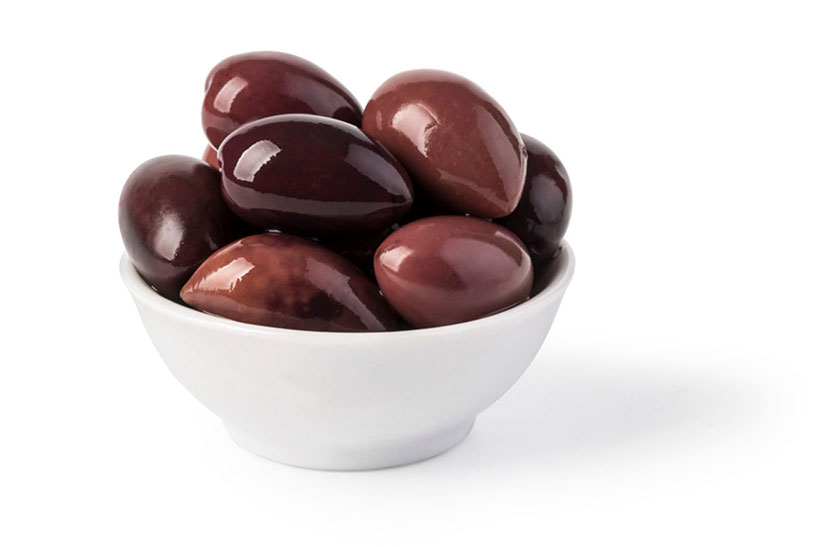
Here is a close-up picture of what kalamata olives look like;
These purple olives are one of the best olives to eat for health, as they contain an impressive range of health-protective compounds.
How Are They Prepared For Consumption?
Growers pick these Greek olives by hand to avoid bruising the fruit.
Following the harvesting of the olives, workers either process them into olive oil or prepare them to be table olives.
The olives contain a stone in the middle, and generally, they are not pitted before commercial retail.
However, when fresh the olives are incredibly bitter, and so they enter a process of ‘debittering.’
There are two different ways to do this – a long and a short way.
First, the short way involves soaking the olives in brine for a week. After this, workers pack them for retail with brine, wine vinegar, slices of lemon and olive oil.
The long way involves making a slit in each olive, and storing them in 10% salt-water for fermentation until they debitter. This process usually takes around three months (2).
Nutrition Facts
Here is the nutritional value of kalamata olives per 100g;
- Calories: 239
- Carbohydrate: 1 gram
- Fat: 22.7 grams
- Protein: 2 grams
As we can see, the major macronutrient is fat, and the majority of this comes from oleic acid.
Oleic acid is the predominant fatty acid in olive oil, as well as red meat, lard, tallow, and avocados.
This compound is one of the most researched in the world, and it has links to a reduced risk of cardiovascular disease.
In particular, research shows that it has anti-inflammatory effects and improves vascular function (3, 4).
Kalamata olives only contain a small amount of protein and carbohydrate – mainly fiber.
Vitamins and Minerals
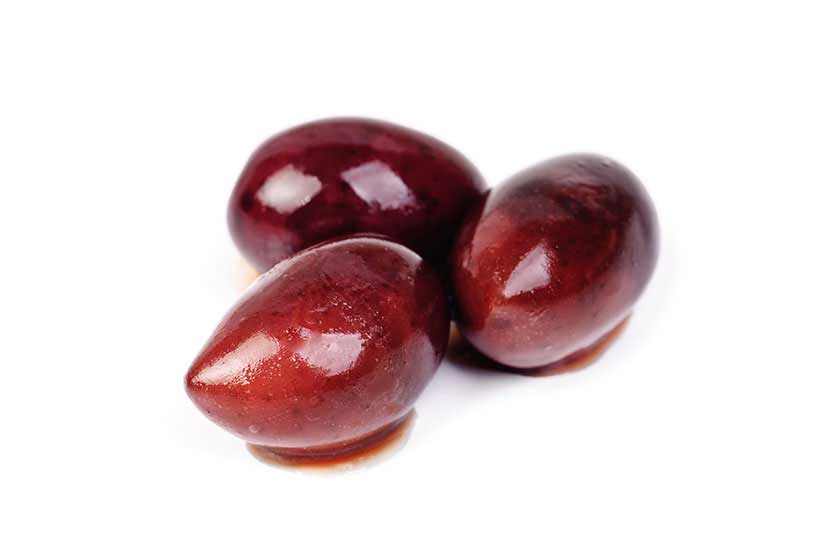
These little purple olives pack a big nutritional punch, and these are the major vitamins and minerals they contain;
Calcium
As the most abundant mineral in the human body, calcium is crucial for healthy bones, gums, and teeth.
Also, it is essential for the proper functioning of nerves and muscles — including the heart (5, 6).
Copper
Kalamata olives contain a significant source of copper.
We can find copper throughout the human body, in the organs and muscles, and it also plays a part in energy production.
Insufficient copper consumption may cause a broad range of damage in the body, adversely impacting how we process cholesterol and glucose, control blood pressure, and our immune system (7).
Iron
Iron is a truly essential mineral, and red blood cells contain approximately 70% of it as hemoglobin.
Here this hemoglobin plays a vital role in transferring oxygen from the lungs to our tissues (8).
Sodium
As they are packed in salty water, kalamata olives contain a high amount of sodium.
Sodium is a much-misunderstood nutrient which is critical for health. However, getting the right amount is very important.
For the average person, too much and too little can both cause problems.
Notably, excessive or insufficient sodium intake may both be cardiovascular risk factors (9, 10, 11).
Vitamin A
Vitamin A is essential for our eyesight, skin health, and a healthy immune system.
Animal foods such as eggs and liver provide the best source of vitamin A, known as preformed vitamin A.
However, despite being less absorbable, the plant form (pro-vitamin A carotenoids) still have benefits.
It helps that olives are a source of fat, as vitamin A is fat-soluble (12, 13).
Vitamin E
Plant-based fats such as nuts and avocados are significant sources of vitamin E, and kalamata olives are no exception.
Vitamin E is a fat-soluble vitamin that is the major component of our antioxidant defense system, and it is only available through the food we eat.
As a result, it helps prevent free radical oxidative damage, which can age the body and lead to chronic disease (14, 15).
Along with vitamins A, D and K, vitamin E is fat-soluble and the fatty acids in kalamata olives “carry” it well.
Kalamata Olives Contain Powerful Polyphenols

One of the best benefits of kalamata olives is the polyphenols they contain.
A large body of research exists on these health-protective compounds and shows impressive benefits;
Gallic Acid
Gallic acid is a kind of phenolic acid that has powerful antioxidative properties.
In addition to protecting our cells, research also shows that gallic acid helps improve insulin sensitivity and has anti-viral properties.
It also has potential in Alzheimer’s treatment, with animal studies showing that gallic acid reduces neural damage associated with the disease (16, 17).
Hydroxytyrosol
Kalamata olives are a significant source of hydroxytyrosol, a compound which is one of the most potent polyphenols in the world.
Hydroxytyrosol has a range of beneficial effects, which include improving vascular function and protecting LDL cholesterol from oxidation (18, 19).
Oleocanthal
A natural Ibuprofen? Well, that’s what researchers say about this anti-inflammatory antioxidant that is present in kalamata olives.
In addition, it exhibits anti-cancer properties. Clinical tests show that oleocanthal “was destroying cancer cells” within 30 minutes to an hour, while “leaving healthy cells intact.”
Further, human trials demonstrate a reduction in oxidative stress (20, 21).
Oleanolic Acid
This phytochemical is present in all types of olives and grapes.
We can find concentrated amounts of oleanolic acid in both wine and olive oil. A wealth of studies shows that it has anti-inflammatory, anti-microbial and anti-tumor effects (22, 23, 24).
Oleuropein
As the most prevalent polyphenol in olives, oleuropein is responsible for the bitter taste.
The compound has potent antioxidant activity and shows both cardioprotective and neuroprotective properties in human studies (25, 26).
Tyrosol
Another powerful antioxidant compound in kalamata olives is tyrosol.
Although this polyphenol occurs in a range of foods such as grapes, green tea, white wine and red wine, olives are by far the most significant source.
Further, kalamata olives have the highest concentration of it compared to other varieties.
One of the significant benefits of tyrosol is that it helps inhibit the oxidation of LDL cholesterol, contributing to reduce cardiovascular risk (27, 28).
All Olives May Help To Reduce Risk of Disease
Olives (and olive oils) have an extensive body of research behind them showing they help to lower chronic disease risk.
As olives and olive oil contain the same compounds—in varying proportions—they all have benefit in this area.
Alzheimer’s Disease
- Olive oil plays a significant role in the diet of Mediterranean region people. These peoples display long life expectancy and lower levels of dementia (29, 30).
- Extra virgin olive oil (EVOO) displays neuroprotective effects in animal studies and reduces oxidative damage in the brain (31).
- Although it’s possibly not the cause of Alzheimer’s disease, amyloid plaque in the brain is a risk factor. Studies demonstrate that chemical compounds in olives such as oleocanthal enhance plaque clearance from the brain (32).
Cancer
- In a meta-analysis of 13,800 patients across 19 different studies, olive oil intake is inversely related to cancer prevalence (33).
- A randomized, controlled clinical trial (RCT) compared three diets; a Mediterranean-style diet, and then the same diet plus either olive oil in one group or nuts in another group. Rates of breast cancer were almost 3x lower in the olive oil group compared to the standard diet, and 2x lower compared to the nuts group (34).
Cardiovascular Disease
- In a randomized intervention study of 7216 people with a high risk of cardiovascular disease, participants in the highest olive oil consumption level had a 35% reduced risk (35).
- Greek men have a longer life expectancy and less risk of cardiovascular disease compared to European and North American men. One reason why may be the high intake of olive oil, which increases the levels of HDL cholesterol (36).
- One study separated participants into two groups and fed them the same meal – one group ate it with 10g of EVOO, and one group just had the meal. The researchers analyzed blood glucose, oxidized LDL, triglycerides and other cardiovascular risk markers 2 hours before the food, and 2 hours after. Across participants who ate EVOO with their meal, they had “significantly lower” blood glucose and oxidized LDL levels (37).
- In an intervention study featuring 102 patients with metabolic syndrome, researchers split the participants into four groups. The first group received their regular meal, the second group received their meal plus 3g of fish oil, the third group received the usual meal plus 10g EVOO, and the last group received their meal and both the fish oil and EVOO. The solely EVOO and only fish oil groups both exhibited a decrease in oxidative stress and an improved LDL/HDL ratio. However, the group receiving both fish oil and EVOO had the most significant improvements in health markers (38).
Type 2 Diabetes
- A recent study wanted to look into what effect a 10g dose of EVOO with a meal has on pre-diabetic patients with impaired fasting glucose. Notably, the study showed that there was a post-prandial “significant decrease in blood glucose and triglycerides” compared to a meal without EVOO (39).
- A meta-analysis of 29 existing trials and 4 cohort studies featuring over 15,000 type 2 diabetics showed that those consuming the highest amount of olive oil had the greatest glycemic control (40).
How to Use Kalamata Olives
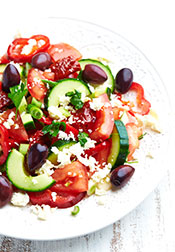
There are many different ways in which you can use kalamata olives.
First, they taste great just on their own.
Additionally, they make a perfect combination with cheese and fruits on a wine platter – or you can even slice them and add them to a healthy pizza.
You should be able to get them from any reasonably sized market, or you can buy them online.
Kalamata Recipes
Should you wish to try a few more creative recipes, then here are some kalamata recipes to try out.
- Roasted Chicken in Wine Mushroom Cream With Kalamata This recipe is packed full of delicious, flavorful ingredients like heavy cream, white wine chicken broth, garlic, and mushrooms.
- Braised Greek Chicken Thighs Another chicken-based recipe, and yet more tasty ingredients. This recipe combines onions, garlic, kalamata olives, white wine, herbs and spices, and chicken thighs.
- Marinated Cheese and Olives: The idea of marinating both cheese and olives together may seem unique, but it’s common in Mediterranean countries. And for a good reason – it’s delicious! This recipe features cheese and kalamata olives marinated in garlic, pepper, rosemary and herb dressing.
Final Thoughts
Studies have shown how healthy olives are time and time again; they’re high in healthy fat, and packed full of polyphenols.
Kalamata olives are one of the best varieties and to top it all off, they are kind of tasty too.

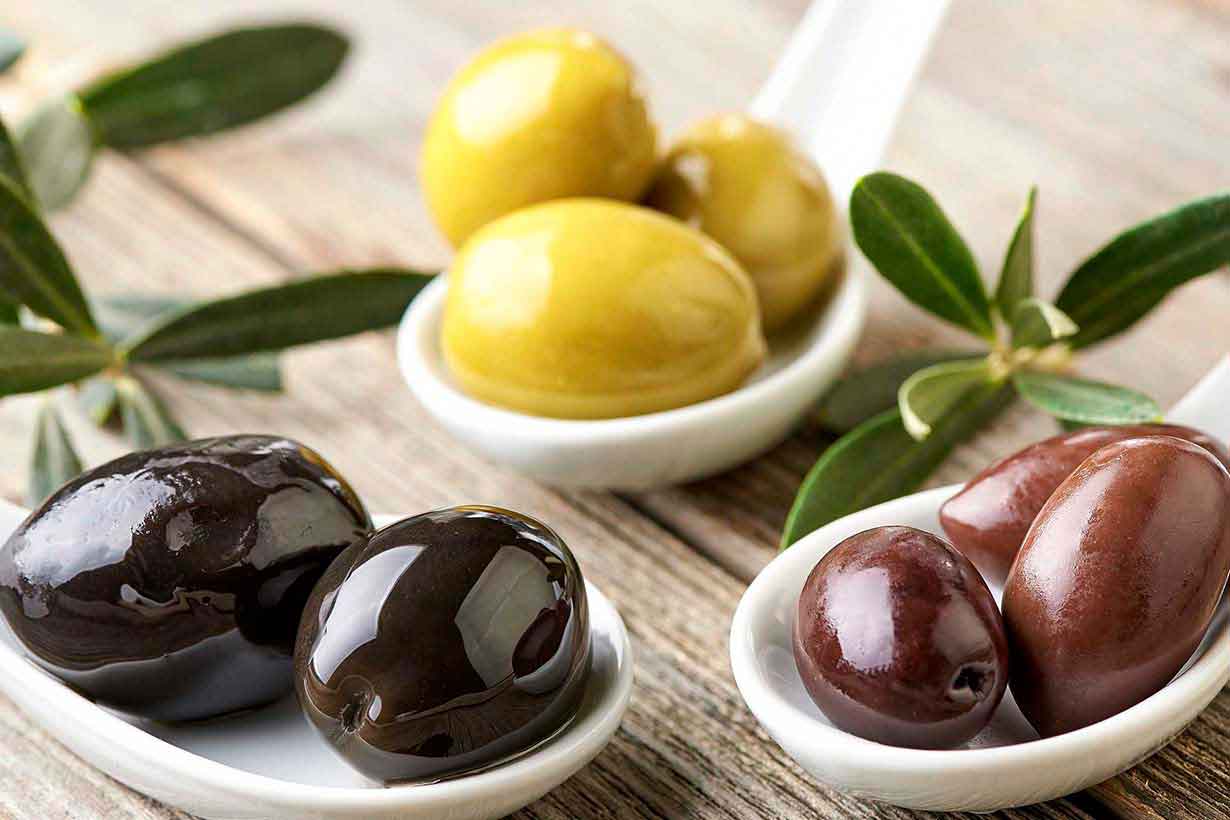
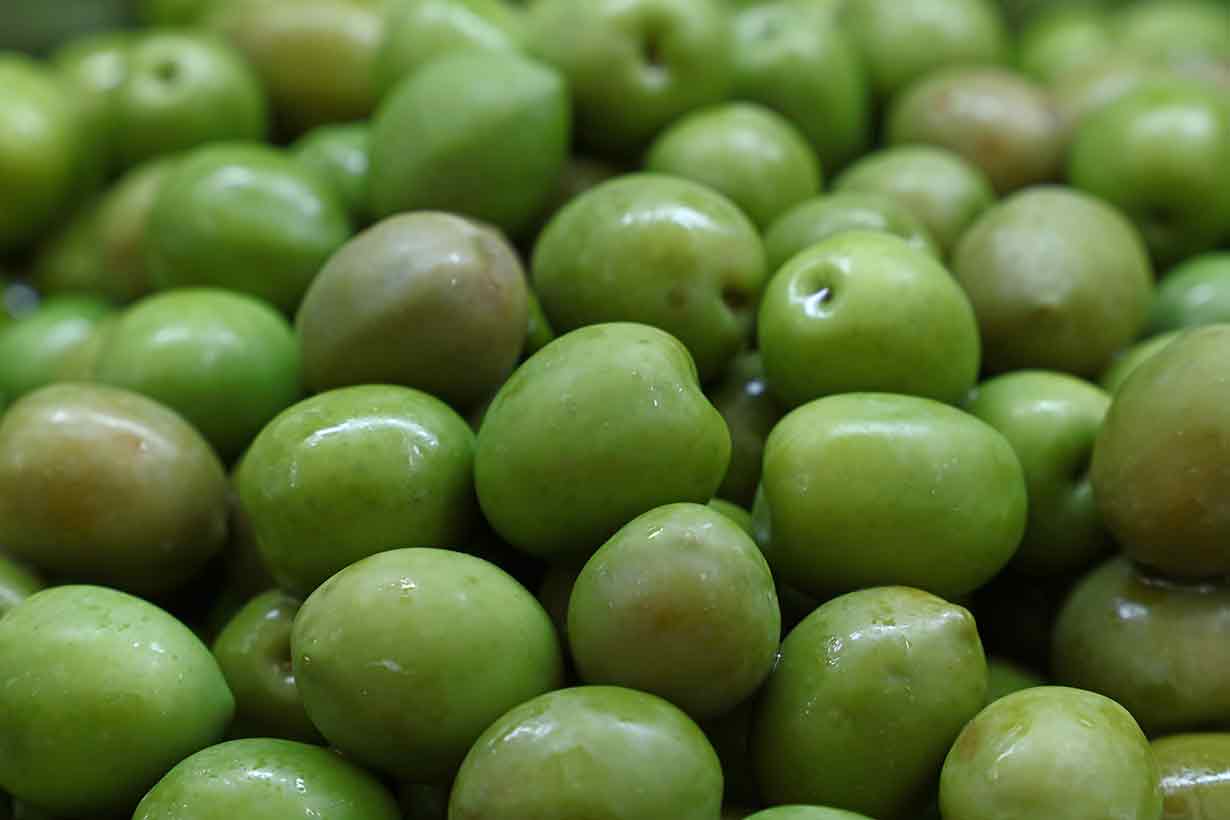
18 thoughts on “Kalamata Olives: One of the Healthiest Foods on Earth”
Thanks for the great information!
Thanks Lauren!
This is impressive, I love olives so it’s time to ramp up consumption! Thank you
Thanks Victoria!
I love olives too 🙂
Very informative, thank you!
Kalamatas are my absolute favourite. I have at least a half dozen every day as a snack in addition to lots of olive oil. Since dementia runs in my family, I am hoping that an unprocessed, sugar free and good fats diet will help protect me.
Thanks!
Nothing is for certain, but eating healthily certainly doesn’t harm.
It (Alzheimer’s) runs in my family too and there’s a post I wrote about it here: https://nutritionadvance.com/type-3-diabetes-alzheimers-diet
I have been eating 36 KO 6 out of 7 days a Week for months now and my system is Great all around improvement ! and very satisfying with red wine !!!
Yes, they’re delicious! I have some at the moment which are stuffed with cheese and herbs… very tasty 🙂
Do Kalamata olives contain mold?
They shouldn’t do, but it can grow if they have been contaminated with bacteria, unfortunately.
Since returning from Greece I cannot get enough of these olives! Love them.. I was lucky enough by searching for them to find them at Costco shipped in from Greece….love the little snacks!
Me too – they taste great!
There are some I like that are stuffed with feta and chilli peppers… they are interesting and kind of nice too.
I just have a half a bowl for breakfast … did they mentioned in the article they are also full of healthy probiotics making your gut happy???!!! Yummie
Indeed, they are yummy!
I usually buy pitted Kalamata olives. Are these less healthy than unpitted, and would it make sense to rinse off the brine to lower the overall sodium content?
I wouldn’t think so – if you like pitted olives best, just go with what you prefer. You can wash the brine off if you want, but I think it is just personal preference really – I personally wouldn’t worry too much about a little extra salt.
I live near a small Lebanese groc. store that sells Kalamata olives in bulk..cheaply. I’m addicted!! Thay are so delicious, but I only really like the one with pits. I eat some every day (6-8). They go well with just about everything. Had no idea how super nutritious they were. Thank you so much for this great informative article!
Thanks Lynn! I’d agree that Kalamata olives go well with everything – but for me, pairing them with cheese is the best!
Comments are closed.